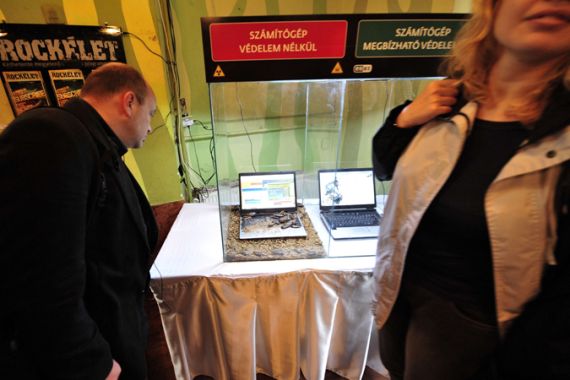Computer hacking: Who benefits?
Malicious computer including virus writing and hacking costs businesses globally more than a trillion dollars per year.

 |
| Hackitvity brings together software security companies and hackers from all over the world [AFP] |
Malicious computer use such as virus writing and hacking cost businesses globally more than $1 trillion each year, according to a study from computer security company McAfee.
The projection is based on responses to a survey of more than 800 chief information officers of companies around the world.
Keep reading
list of 4 itemsHong Kong’s first monkey virus case – what do we know about the B virus?
Why will low birthrate in Europe trigger ‘Staggering social change’?
The Max Planck Society must end its unconditional support for Israel
The respondents estimated that in they lost data worth a total of $4.6bn and spent about $600 million cleaning up after breaches, McAfee said.
The recent recession is only increasing the security risk for corporations, respondents said, with 42 per cent reporting that displaced workers were the biggest threat to sensitive information on the network.
More than one quarter of the respondents said they avoid storing data in China, and 47 per cent of the Chinese respondents said they believed the US poses the biggest security threat to their data.
The research indicates that more and more vital digital information, such as intellectual property and sensitive customer data, is being transferred between companies and continents – and lost.
The average company has $12 million worth of sensitive information residing abroad. Companies lost on average $4.6 million worth of intellectual property each year.
Hacktivity 2010
To mark these astounding figures, the Hungarian capital Budapest is hosting Hacktivity 2010, the largest computer hackers’ conference in Eastern Europe.
This ‘geek-fest’ brings together software security companies, computer experts and hackers from all over the world, combining lectures and discussions on serious issues such as internet security, with lighter fare and games.
Software companies these days use hackers to see how secure their new programs are – hackers benefit by learning new tricks.
The conference comes at a time of mounting concern over software piracy and other cyber crimes. Hacking is fast becoming the 21st century tool for espionage.
Some 1,000 participants are expected to attend the two-day event, according to organisers.
Bruce Scheier, a world-renowned cyber security expert, opened the congress with a keynote speech.
Other well-known participants and lecturers included Alexander Kornbrust of Oracle, Robert Lipovsky form the ESET computer security company’s laboratory in Bratislava, and US hacker Mitch Altman, who was organising a hardware workshop.
At the leisure zone participants can test their ability to break into systems and take control of foreign computers in a variety of games, from “Hack the Vendor” to “Capture the Flag”.
Taliban hacked
Business, government and regular computer users and the only ones dealing with hackers: the Taliban are also facing the problem. Infamous for their rejection of western materialism, the so-called islamic Emirate of Afghanistan faced an attack in June 2010, Wired magazine reported.
Abu al-Aina’a al-Khorasani, an administrator with what Wired calls an “elite jihadi forum endorsed by the Taliban” has warned users to be careful of recent activity. The “group’s main site and the site of its online journal Al-Sumud, have been subject of an ‘infiltration operation'”.
On the Fallujah forum, Khorasani warns online Islamists “to not enter any of the links of these website and not to even surf [the material] until you receive the confirmed news by your brothers, Allah-willing,” Wired reported.
The Taliban websites have been hacked before, but the latest job should be particularluy concerning to the group, says Evan Kohlmann, a computer analyst with Flashpoint Partners.
“[T]his would be the first instance that I’m aware of it being actually ‘infiltrated,’” Kohlmann told Wired.
“It’s an unsettling prospect for security-minded online jihadists, because such sites can be manipulated by a variety of hostile parties in order to harvest a breathtaking amount of personal data on regular visitors.”